Let's just point out that your graph is still from 1975. And your claim about what it contradicts is patent nonsense.
Announcement
Collapse
No announcement yet.
Fire Season
Collapse
X
-
I expect that it hasn't been adjusted to take into account heat island effects and so on, given that it precedes people correcting their data for observed biases. And, more pertinently, it excludes the last 40 years - which are rather relevant to the whole thing. Why would you choose a 1975 graph?
Comment
-
The data in nearly every graph published by the weather agencies after the late 90s has been altered to cool off the past and boost recent temperatures, there is an overwhelming systematic bias in this direction, as shown in this graph plotting the amplitude and direction of adjustments applied to NOAA temperature measurements:
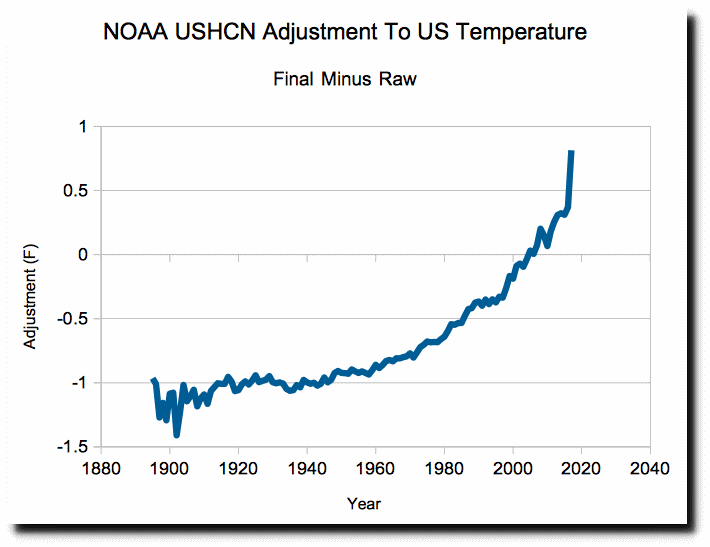
As you can see, they've lowered older temperatures from the 1920s-40s by 1F, and raised recent reading by nearly the same amplitude.
https://realclimatescience.com/2017/...than-it-seems/
Here is for example US historic temperatures as published by NOAA in 1999, vs. the more recent graph showing how they've adjusted that data, applying the same bias of adjusting past temperatures downwards and boosting recent temps:
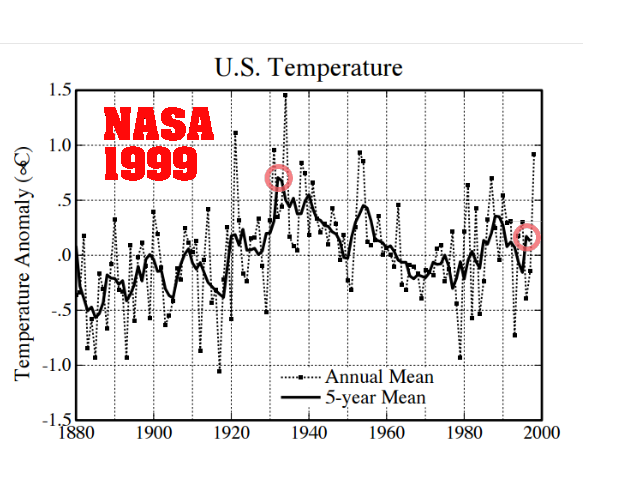
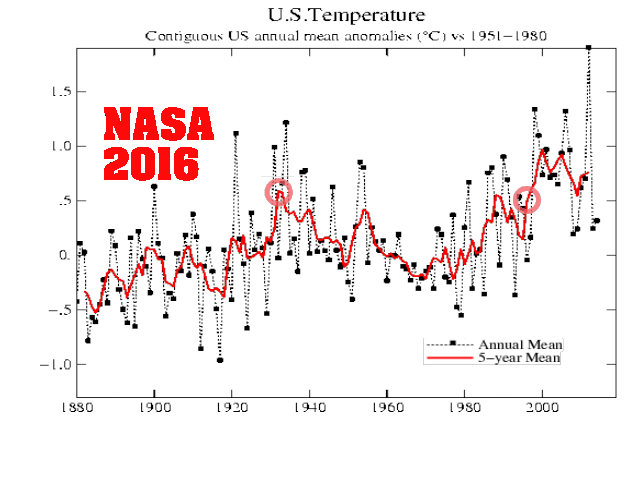
You can also observe that adjustment bias applied to recent data sets when you compare it to RSS satellite data, the raw/unaltered data matches the RSS data trend pretty closely:
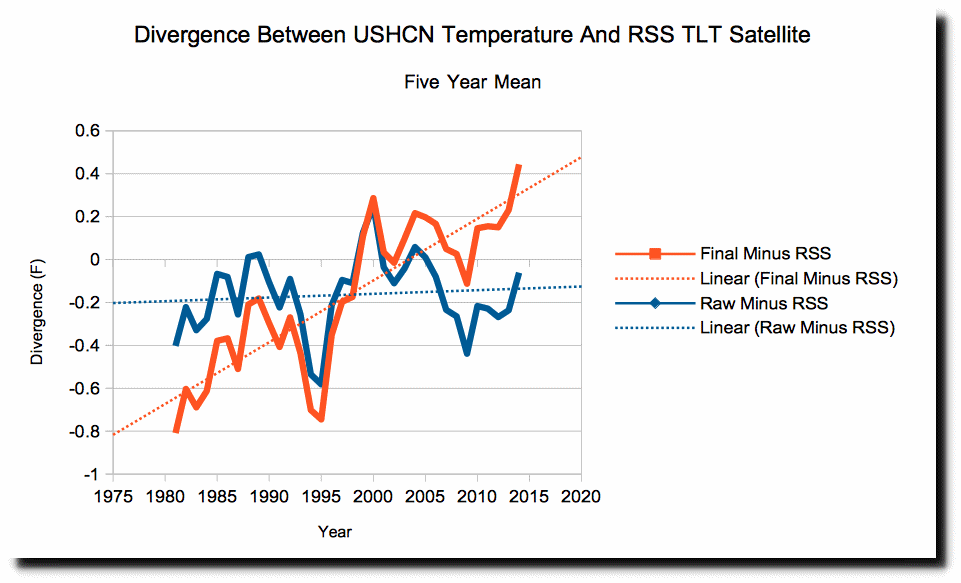
Amd since you've brought up urban the topic of urban heat island effect, let's take a look at how NOAA "adjusted" weather station data to account for UHI. You would expect them to lower more recent measurements in urban/suburban stations, because UHI will artificially boost temperatures (especially nighttime readings). What NOAA actually did instead was to raise recent measured data from urban stations, which makes no sense:

Comment
-
It's bizarre. In this case it's even more bizarre because it seems to be an actual claim that there is no climate change, rather than the usual quibbling about mechanisms, or suggesting that there's nothing we can do about it. It always looks like trolling, because nobody can spend that much time looking at the data and still come down against the science. But I don't think it is trolling, because a troll wouldn't spend that much time looking at the data.
Comment
-
The big one close-ish to here is the Holy Fire, but that's still a long way to the north - mostly in wild mountain space between Orange and Riverside counties. The biggest town under threat is Lake Elsinore.
There's more threat here from the small brush fires that seem to start every day - yesterday one caught up by Ramona, but they had that contained at just a couple of hundred acres. If any of them doesn't get stopped quickly, they could rapidly get seriously out of control.
Comment
-
I've been working in green building/land development and have managed a large forest park, I became very interested in the science of climate and have done a lot of research and reading on the subject. As well I have a pretty solid academic/technical background in data analysis and statistics. I've come to the conclusion that CAGW (man-made catastrophic warming) is overblown, and that CO2 concentration is not the main climate driver. I don't deny there has been a warming in the 1980s and 90s, but I doubt it's primarily driven by human CO2 emissions, and I think that the projections are alarmist and self-serving. The warming that took place in the 1920s and 30s is similar in intensity and duration to the recent warming, and the cooling that took place in between goes against the CO2 as the main driver theory.Originally posted by ad hoc View PostI'm always intrigued to find out why people who don;t work for oil companies want to deny climate change. What does one get out of the rubbishing of pretty much universal scientific opinion? Is it just an exercise in bloody mindedness?
As well, it really doesn't take that much work to understand that the scientific consensus on this issue is not what's commonly reported. There is a sizeable minority of scientists that doubt or outright reject the CAGW narrative and that aren't politically or economically motivated in their skeptical, seemingly contrarian assessment. People like Dr. Judith Curry, who was the head of the Earth and Atmospheric studies at Georgia Tech (one of the top schools in the field) got chased out of academia and paid a personal price for going against the established dogma.
Comment
-
Plant life would crash, photosynthesis cannot take place at those CO2 concentrations. The rise of CO2 concentration from ~300ppm earlier in the 20th century to the current 400ppm has resulted in an increase in green cover globally of about 20%-30%. This is known as "global greening", and it's most dramatic in drier landscapes like the Sahel or west India, as higher CO2 levels result in less leaf evaporation in the process of photosynthesis.Originally posted by anton pulisov View PostLinus, what would happen if CO2 content in the Earth's atmosphere went down to 50 ppm?

Higher CO2 concentrations are part of the reason why global crop yields have kept climbing.

Comment
-
I've published in the journal Climate of the Past twice and trust me when I say that scientists who don't do statistics properly because they prefer to concentrate on selling a sexy message piss me the hell off. There is a bullshit crisis in science and climate change does particularly well to attract the bullshitters. The presence of bullshitters doesn't change certain facts though.I've come to the conclusion that CAGW (man-made catastrophic warming) is overblown, and that CO2 concentration is not the main climate driver
You are also right that CO2 is not the main driver of climate. But then I don't think anybody claims that. The main driver of climate is the big ball of fire in the sky and how the orbit of our planet around said ball of fire changes through time. But CO2 (besides being plant food, don't think anybody denies that) IS a greenhouse gas. It's a fact of physics. Infrared radiation reflecting from the Earth has a wavelength that interacts with CO2 and causes it to absorb heat. Watch Iain Stewart demonstrate it: https://youtu.be/Ot5n9m4whaw The effect of it on the heat balance of the Earth can be quantified. It's a piece of piss. Climate scientists just want to make it look more difficult than it is because otherwise they'd be out of a job.
On geological terms what we are doing now isn't a big deal. But on human terms it's huge. Cities will be flooded. It's going to happen. It's already too late to stop that.
Comment
-
Anton is entirely correct on all points here. Particularly the last paragraph, which is really important. Human civilisation and society has been built and developed for the current climate state (I was going to say equilibrium, but that wouldn't quite be right). Fucking up the climate a bit really fucks up humans a lot. What it looked like during previous ice ages or warm spells is really not relevant because there weren't 7 billion people living on the planet at those times.
Comment
-
SB, that's a bit too malthusian. Even with 7 billion people, and assuming CO2 is the mortal danger, human CO2 emissions make up less than 4% of the total emission, over 96% are natural. As well, CO2 levels have been far greater than current ones in previous geological eras, life thrived under those conditions and the earth did not turn into a fireball.
Quick answer before I bolt to the wilderness for the weekend... I disagree with the bolded part. Presenting the CO2 greenhouse as a binary phenomenon is too simplistic and misleading.Originally posted by anton pulisov View PostI've published in the journal Climate of the Past twice and trust me when I say that scientists who don't do statistics properly because they prefer to concentrate on selling a sexy message piss me the hell off. There is a bullshit crisis in science and climate change does particularly well to attract the bullshitters. The presence of bullshitters doesn't change certain facts though.
You are also right that CO2 is not the main driver of climate. But then I don't think anybody claims that. The main driver of climate is the big ball of fire in the sky and how the orbit of our planet around said ball of fire changes through time. But CO2 (besides being plant food, don't think anybody denies that) IS a greenhouse gas. It's a fact of physics. Infrared radiation reflecting from the Earth has a wavelength that interacts with CO2 and causes it to absorb heat. Watch Iain Stewart demonstrate it: https://youtu.be/Ot5n9m4whaw The effect of it on the heat balance of the Earth can be quantified. It's a piece of piss. Climate scientists just want to make it look more difficult than it is because otherwise they'd be out of a job.
On geological terms what we are doing now isn't a big deal. But on human terms it's huge. Cities will be flooded. It's going to happen. It's already too late to stop that.
First, in absolute terms the CO2 greenhouse effect current concentrations is relatively minor due to its logarithmic relationship between CO2 levels and heat absorbed:
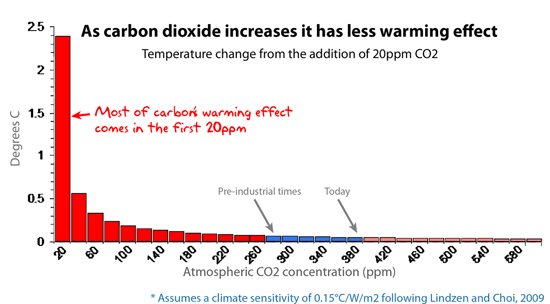
Future increases in CO2 will have a very marginal impact going forward.
Second, the CO2 heat absorption spectrum is relatively narrow, far narrower than the much more prevalent water vapor molecule:
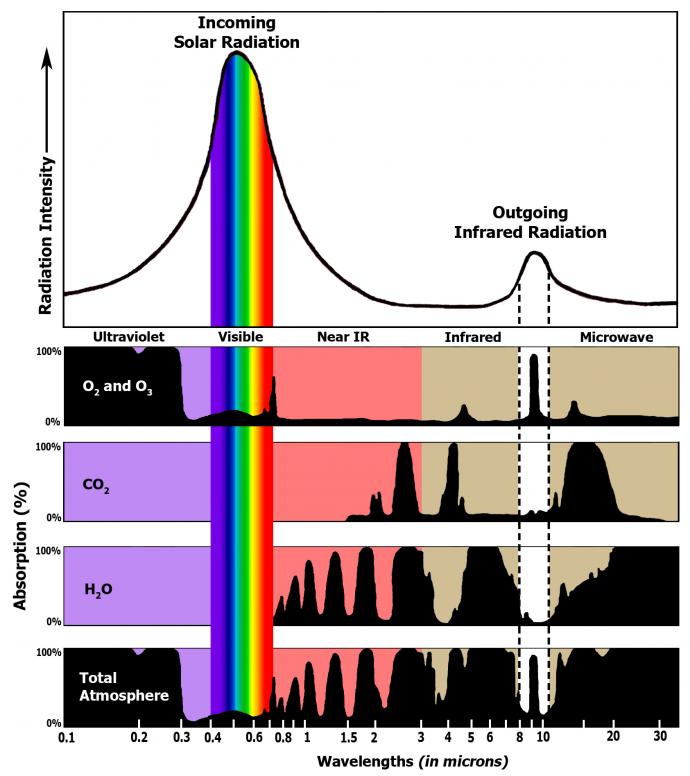
H2O has about 3 times the absorption bandwidth of CO2, and it is orders of magnitude more prevalent in the atmosphere than CO2.
Cities aren't going to be flooded. If you look up tidal gauge records city by city across continents going back a century, you see no significant acceleration in the rate of sea water rise. I can post a comprehensive global database for you next week.
Comment
-
There's a bunch of red herrings in that post. Geological CO2 levels, Water's absorption spectrum, natural emissions, that plant life thrived when humans weren't around, the suggestion that I'm being malthusian when I merely say humans are going to get fucked up, "acceleration" of sea level rise in relation to cities flooding, etc
As it happens, I'm actually one of the least Malthusian people out there. I reckon mankind can sort out most problems in the end. A 3 degree temperature rise might happen, and we'll still end up with loads more than 7 billion people on the planet. The trouble is that getting there will be made massively more miserable for - at least - hundreds of millions of them because of anthropogenic climate change.
Comment
-
Yes, you've posted that before, but it was relative sea level, i.e. it wasn't corrected for changes in land movement. For example, tidal gauges in Stockholm don't show very fast relative sea level rise because land in Scandinavia is rising due to the fact that it used to be covered by a massive ice sheet. Similarly, volcanic islands in the middle of the ocean are rising due to magma production. If you look at absolute eustatic sea level rise, the predictions from the 1980s have been bang on thus far. We now also have satellites that can measure sea level rise, the JASON and TOPEX satellites, which have measured a clear sea level rise for almost three decades now. I suppose they are in on the conspiracy as well?Cities aren't going to be flooded. If you look up tidal gauge records city by city across continents going back a century, you see no significant acceleration in the rate of sea water rise. I can post a comprehensive global database for you next week.
The Lindzen stuff you posted was accepted in Geophysical Research Letters. It is yet another demonstration of why we need to get away from commercial journals with non-public peer review. Peer-review is a crapshoot and it all depends on who is selected as reviewer and if they do their job properly. There is a comprehensive take down of the Lindzen work you cited here.
Science is not black and white. There are those who would blame absolutely everything on CO2. You do the opposite and say nothing is to blame on CO2. You are engaging in the same form of cherry picking as that you claim to criticise...Last edited by anton pulisov; 11-08-2018, 09:49.
Comment
-
I would recommend potholer 54 on you tube for all your climate change information requirements. For instance on man made CO2 making up 3% of the total amount of CO2 in the atmosphere
https://youtu.be/CcmCBetoR18
Comment
-
Over 500 wildfires currently burning in this province. The largest was 680,000 hectares yesterday, a little larger than Devon, to give some UK perspective. Some locals in Northern remote areas reckon the fires in that area won't be extinguished until first snowfall. That's likely at least a couple of months away.
Comment
-
FYI Amor, the size of the area burned in Canada on an average year is about 25,000 square kms, which is roughly the size of Maryland, and about 4 times the size of Devon. As well Canada gets about 9,000 wildfires in an average year, mostly in the western provinces and in mid to late Summer.
This is a basic fact that wasn't mentioned in that G&M article. Anytime you have an article on some kind of weather-related natural disaster, the tendency is to present an alarmist global warming narrative void of any objective statistical baseline; this article is very representative of that type of reporting.
Comment
-
I don't particularly see "an alarmist global warming narrative" in that article though, other than the single quote from the UBC prof perhaps.
FYI Amor, the size of the area burned in Canada on an average year is about 25,000 square kms, which is roughly the size of Maryland, and about 4 times the size of Devon.
Sure but a single fire that's a quarter the size of the total national annual burn is surely worthy of comment?
Comment


Comment